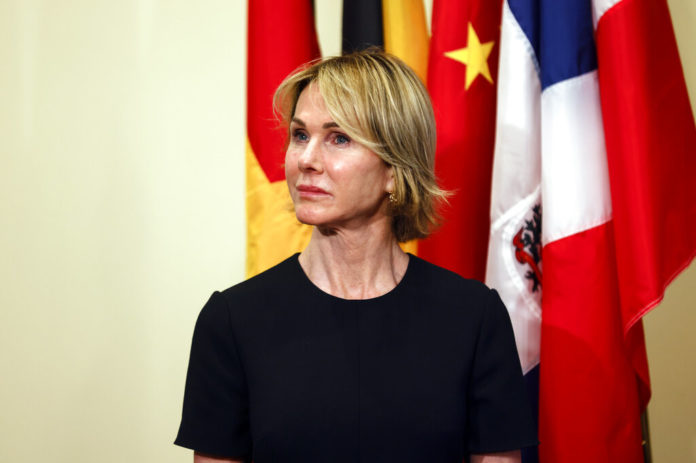
UNITED NATIONS (AP) — The United States vetoed a U.N. resolution Monday calling for the prosecution, rehabilitation and reintegration of all those engaged in terrorism-related activities, saying it didn’t call for the repatriation from Syria and Iraq of foreign fighters for the Islamic State extremist group and their families which is “the crucial first step.”
U.S. Ambassador Kelly Craft said the resolution, ”supposedly designed to reinforce international action on counter-terrorism, was worse than no resolution at all.” She dismissed it as “a cynical and willfully oblivious farce.”
Because of the COVID-19 pandemic, the 15-member Security Council voted by email. The result was 14 countries in favor and only the U.S. opposed. It was announced by the current council president, Indonesia’s U.N. Ambassador Dian Triansyah Djani, whose country sponsored the resolution.
In her statement explaining the U.S. veto, Craft pointed to her comments at a council meeting on counter-terrorism last week. She sstressed then that repatriation and accountability for crimes by fighters for the Islamic State extremist group, also known as ISIS, and their family members are essential so they “do not become the nucleus of an ISIS 2.0.”
“It is incomprehensible that other members of this council were satisfied with a resolution that ignores the security implications of leaving foreign terrorist fighters to plot their escape from limited detention facilities and abandoning their family members to suffer in camps without recourse, opportunities, or hope,” she said on Monday.
Craft said last week the Trump administration was disappointed that Indonesian efforts to draft “a meaningful resolution … were stymied by council members’ refusal to include repatriation.”
That was a reference to Western Europeans, especially, including Britain and France, who have opposed the return of IS fighters and their families, except in the case of orphans and some children. The British government says those who are in custody in Syria and Iraq should face justice there rather than going on trial in the U.K.
Craft said the U.S. brings its citizens home and prosecutes them when appropriate. She quoted U.S. Secretary of State Mike Pompeo as saying: “We want every country to take their citizens back. That’s step one. It’s imperative that they do so.”
A UK Foreign Office spokesperson, speaking with customary anonymity, said after the vote: “We regret the resolution was not adopted. We are working closely with international partners to reduce the risk posed to us collectively by foreign fighters.”
The defeated resolution did support the return of children, but not fighters of families.
It encouraged all countries to cooperate in addressing the threat from “foreign terrorist fighters” or FTFs, “including by bringing them to justice, preventing the radicalization to terrorism and recruitment of FTFs and accompanying family members, particularly accompanying children, including by facilitating the return of the children to their countries of origin, as appropriate and on a case by case basis.”
The Islamic State group, which once controlled large swathes of Iraq and Syria, lost its last Syrian strongholds in early 2019. But despite the loss of its self-styled caliphate, U.N. experts said earlier this year that the extremist group is mounting increasingly bold attacks in Syria and Iraq and is planning for the breakout of its fighters in detention facilities.
U.N. counter-terrorism chief Vladimir Voronkov said in July that his office had received information that 700 people died recently in two camps in northeast Syria — al-Hol and Roj — where more than 70,000 mainly women and children connected to Islamic State fighters are detained in “very dire conditions.”
The camps are overseen by Kurdish-led forces who allied with the United States and spearheaded the fight against Islamic State fighters.
The International Crisis Group reported on April 7 that there are 66,000 women and children in al-Hol and 4,000 in Roj, most of them relatives of IS extremists, “but some former affiliates of the group themselves.” The Brussels-based think tank said that the majority are either Syrians or Iraqis, with the numbers roughly split, and around 13,500 are from other countries.
The group said humanitarian workers described the detention sites “as ridden with tuberculosis and perilously overcrowded, with one speaking of `dramatic mortality rates.’” This has since been compounded by the COVID-19 crisis.
In addition to the al-Hol and Roj camps, the Kurdish fighters are guarding thousands of IS fighters and boys in prisons.
Voronkov urged the international community to tackle “the huge problem” of what to do with these people, saying keeping them in camps “is very dangerous.”
He warned that “they could create very explosive materials that could be very helpful for terrorists to restart their activities” in Syria and Iraq.
But the counter-terrorism chief also said: “No country would like to have these people back, with this very negative and very dangerous terrorist background.”
As reported by Vos Iz Neias
